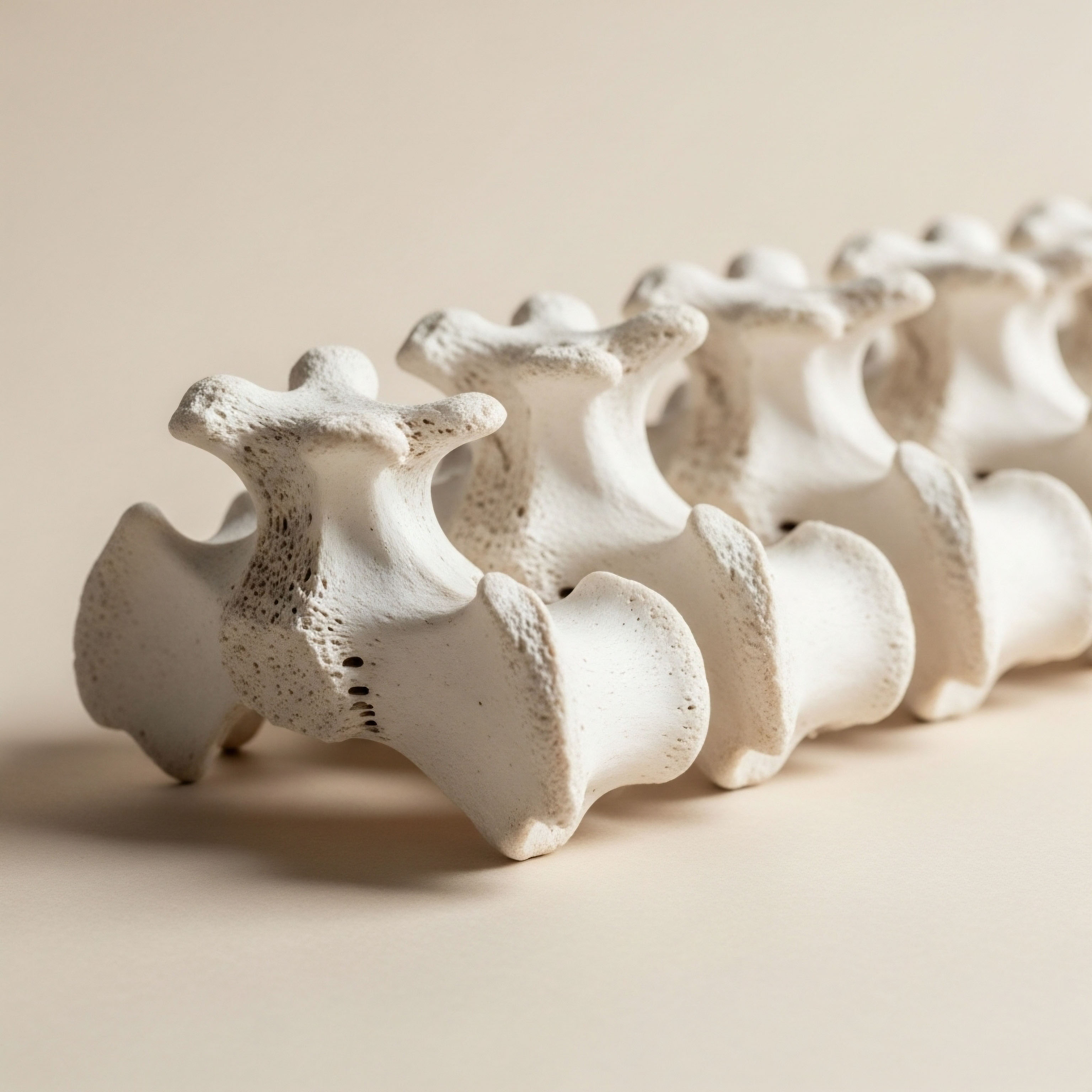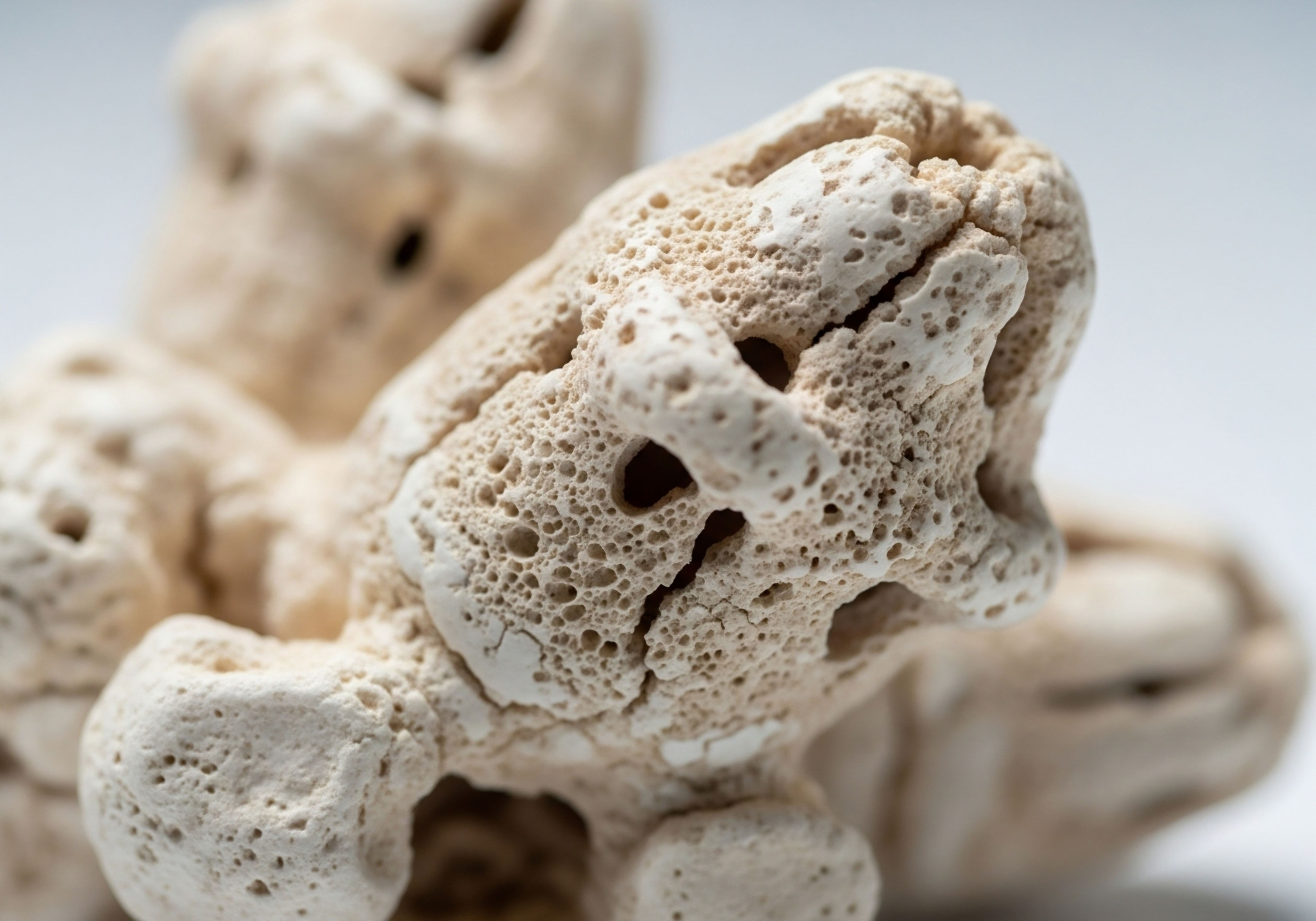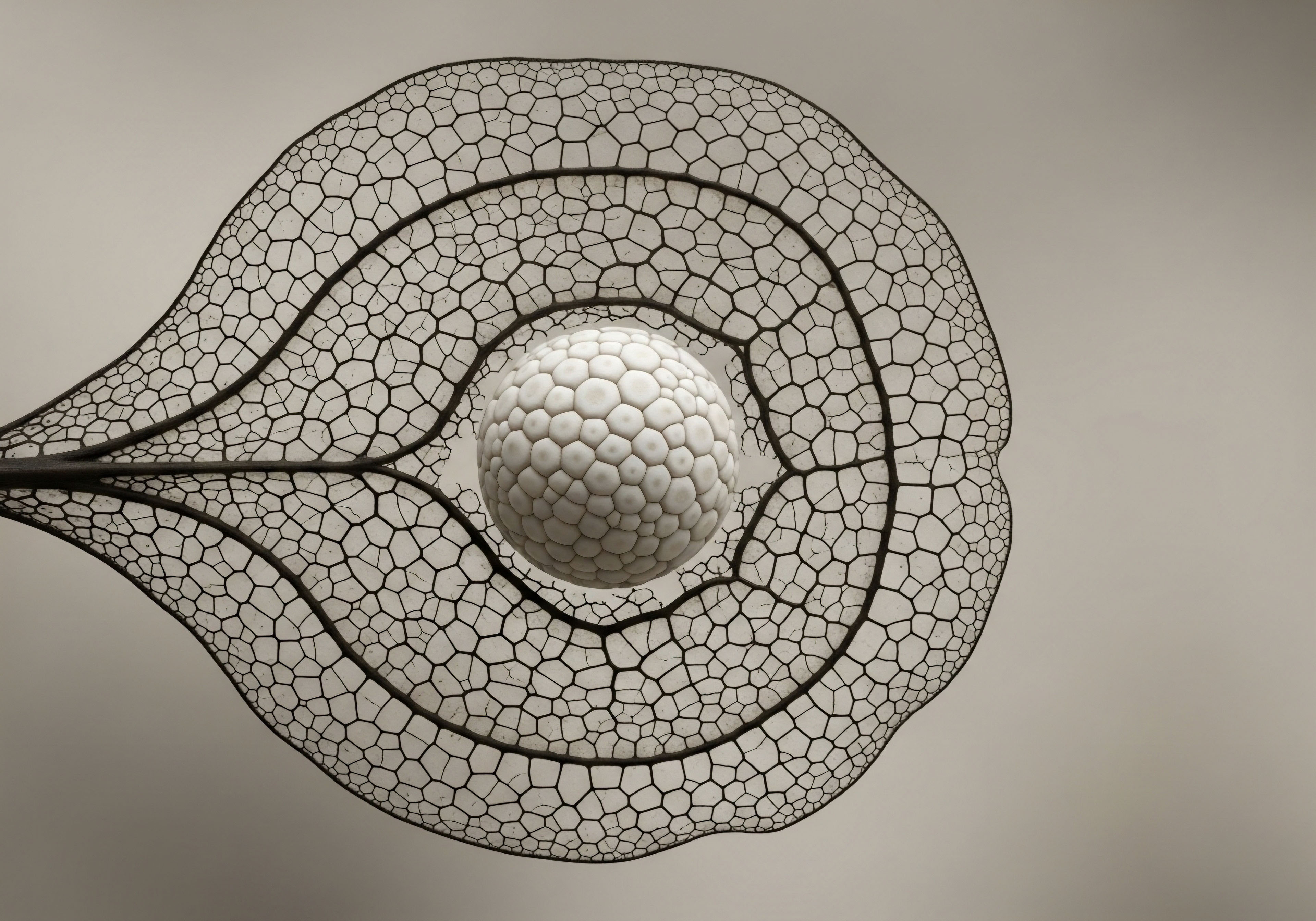

Fundamentals
You feel it deep in your bones, a pervasive fatigue that sleep no longer seems to touch. It is an exhaustion that coffee cannot fix and a weekend of rest cannot resolve. This experience, this profound sense of running on empty, is a biological signal.
Your body is communicating a disruption in its most fundamental operating system, the intricate network of hormones that dictates energy, mood, and rest. Understanding the language of your endocrine system is the first step toward reclaiming your vitality. The conversation begins with sleep, the master regulator of your internal biochemical orchestra.
Sleep is an active, dynamic process of cellular repair and systemic recalibration, governed by a precise hormonal timetable. When you are exposed to natural light in the morning, your adrenal glands produce a peak level of cortisol. This steroid hormone is designed to mobilize energy, increase alertness, and get your system ready for the demands of the day.
As daylight fades, your pineal gland begins to secrete melatonin, a hormone that signals to every cell in your body that it is time to wind down, repair, and prepare for a period of profound rest. This daily rise and fall of cortisol and melatonin is the primary rhythm of your circadian clock, the internal pacemaker that synchronizes your entire physiology with the 24-hour day.
A consistent daily routine is the scaffolding upon which healthy hormonal rhythms are built.
The quality of your sleep directly impacts the production of other critical hormones. During the deep stages of sleep, your pituitary gland releases pulses of human growth hormone (HGH), a vital compound for tissue repair, muscle maintenance, and metabolic health. A single night of insufficient sleep can dramatically reduce HGH secretion, compromising your body’s ability to recover and rebuild.
Simultaneously, sleep regulates the hormones that control your appetite, leptin and ghrelin. Inadequate rest causes leptin, the hormone that signals satiety, to fall, while ghrelin, the hormone that stimulates hunger, rises. This biochemical shift creates a powerful drive for high-calorie, high-sugar foods, creating a difficult cycle of metabolic stress.

The Architecture of Restorative Sleep
Achieving hormonal balance through sleep requires an environment and a routine that honors your innate biological programming. Your body is exquisitely sensitive to light, temperature, and timing. Creating a consistent sleep-wake schedule, even on weekends, is the most powerful lifestyle adjustment you can make.
This practice anchors your circadian rhythm, allowing your hormones to anticipate periods of rest and activity with precision. Your bedroom should be a sanctuary for sleep, a cool, dark, and quiet space that minimizes sensory input and encourages a state of calm.

Light the Primary Zeitgeber
Light is the most powerful external cue, or zeitgeber, for your circadian rhythm. Exposure to bright, natural sunlight shortly after waking helps to suppress melatonin production and initiate a robust cortisol awakening response. This morning light exposure sets a strong daytime signal that helps to ensure a timely release of melatonin later in the evening.
Conversely, exposure to artificial blue light from screens in the hours before bed can trick your brain into thinking it is still daytime, delaying the onset of melatonin secretion and disrupting the natural transition to sleep. Implementing a digital curfew, a period of at least an hour before bed free from screens, is a critical step in protecting your hormonal sleep signals.


Intermediate
To move beyond the fundamentals of sleep hygiene is to begin actively shaping the hormonal conversations happening within your body. Specific, targeted lifestyle adjustments can modulate the key endocrine pathways that govern sleep quality and duration. This involves a more granular understanding of how diet, exercise, and stress management techniques directly influence the hypothalamic-pituitary-adrenal (HPA) axis and the production of sex hormones, all of which are deeply interconnected with your sleep architecture.
The HPA axis is your body’s central stress response system. Chronic activation of this system, due to psychological stress or physiological stressors like poor diet and inflammation, leads to elevated cortisol levels. When cortisol remains high into the evening, it directly antagonizes melatonin, making it difficult to fall asleep and stay asleep.
Therefore, a primary goal of intermediate lifestyle adjustments is to soothe an overactive HPA axis, creating the physiological calm necessary for restorative rest. This is where practices like meditation, deep breathing exercises, and mindfulness become clinical interventions. These techniques have been shown to downregulate sympathetic nervous system activity, reduce evening cortisol, and improve sleep quality.
Strategic nutrient timing and targeted physical activity can powerfully recalibrate the hormonal cascades that support deep, uninterrupted sleep.
Your dietary choices create the raw materials for hormone production and can either stabilize or destabilize your blood sugar, a key factor in sleep continuity. A diet that causes large swings in blood glucose and insulin can trigger nighttime awakenings.
Consuming a meal high in refined carbohydrates before bed can lead to an initial spike in blood sugar followed by a crash, a hypoglycemic event that signals the adrenal glands to release cortisol and epinephrine, waking you up. A more effective strategy is to focus on a balanced evening meal that includes lean protein, healthy fats, and complex carbohydrates from vegetables.
This combination promotes a more stable blood glucose level throughout the night. Additionally, certain nutrients are direct precursors to sleep-promoting neurochemicals. The amino acid tryptophan, found in foods like turkey and chicken, is a building block for serotonin, which is then converted to melatonin in the pineal gland.

Exercise Timing and Type for Optimal Sleep
Physical activity is a potent tool for hormonal regulation, but its impact on sleep is highly dependent on timing and intensity. Regular, moderate-intensity exercise, such as brisk walking, jogging, or resistance training, performed earlier in the day, has been consistently shown to improve sleep quality and duration.
This type of activity helps to regulate insulin sensitivity, reduce stress, and reinforce a strong circadian rhythm. High-intensity interval training (HIIT) can be particularly effective at boosting daytime human growth hormone (HGH) production.
Conversely, performing intense exercise too close to bedtime can be counterproductive for sleep. A high-intensity workout elevates cortisol and body temperature, both of which can interfere with the body’s natural sleep-onset mechanisms. Gentle, restorative activities like yoga and stretching in the evening can be beneficial, as they help to lower cortisol and promote relaxation without significantly raising heart rate or core body temperature.

Can Hormonal Imbalances Be Addressed through Diet?
Dietary adjustments can provide significant support for hormonal balance, particularly in the context of sleep. The following table outlines key dietary considerations and their mechanisms of action:
| Dietary Component | Mechanism of Action | Examples |
|---|---|---|
| Complex Carbohydrates | Promote stable blood sugar and support serotonin production. | Vegetables, whole grains, legumes. |
| Lean Protein | Provides tryptophan, the precursor to serotonin and melatonin. | Chicken, turkey, fish, eggs. |
| Healthy Fats | Support hormone production and reduce inflammation. | Avocado, nuts, seeds, olive oil. |
| Magnesium-Rich Foods | Promotes relaxation and supports GABA receptor function. | Leafy greens, almonds, pumpkin seeds. |

The Role of Sex Hormones in Sleep Architecture
The sex hormones estrogen, progesterone, and testosterone also play a significant role in sleep regulation, and their fluctuations can be a primary driver of sleep disturbances, particularly for women during the menstrual cycle and the menopausal transition. Progesterone has a sedative-like effect, promoting calmness and sleep.
As progesterone levels decline in the second half of the menstrual cycle and during perimenopause, many women experience increased difficulty sleeping. Estrogen is important for maintaining body temperature regulation and supporting REM sleep. Declining estrogen levels can contribute to night sweats and hot flashes that fragment sleep.
In men, low testosterone is often associated with poor sleep quality and conditions like sleep apnea. While lifestyle adjustments can help to support healthy sex hormone levels, significant imbalances may require clinical intervention, such as bioidentical hormone replacement therapy (BHRT), to fully resolve sleep issues.


Academic
A sophisticated examination of sleep optimization for hormonal health requires a deep dive into the molecular and neuroendocrine mechanisms that govern the sleep-wake cycle. The interplay between the suprachiasmatic nucleus (SCN) of the hypothalamus, the body’s master clock, and peripheral hormonal oscillators is a complex system of feedback loops. Lifestyle interventions, from this perspective, are tools for entraining these oscillators and modulating the expression of clock genes that regulate hormonal pulsatility and receptor sensitivity.
The timing of light exposure, for instance, does more than simply suppress melatonin. Light information travels from the retina via the retinohypothalamic tract directly to the SCN. Here, it activates transcription factors like CREB (cAMP response element-binding protein), which in turn modulate the expression of core clock genes such as PER and CRY.
The protein products of these genes form a negative feedback loop that creates the 24-hour oscillation of the SCN. This central rhythm is then transmitted to peripheral tissues, including the adrenal and pituitary glands, synchronizing their hormonal secretions. Chronic exposure to light at the wrong circadian time, a common feature of modern life, can lead to a phase shift in the SCN, desynchronizing peripheral clocks and contributing to metabolic and endocrine dysfunction.
The molecular machinery of our internal clocks is finely tuned, and lifestyle inputs are the primary regulators of its precision.
From a metabolic standpoint, sleep is a critical period for regulating glucose homeostasis and insulin sensitivity. During deep sleep, there is a coordinated suppression of cortisol and a peak in growth hormone secretion. This combination promotes a shift toward fatty acid oxidation for energy, preserving glucose for the brain.
Sleep deprivation disrupts this delicate balance. It leads to elevated evening cortisol, which promotes insulin resistance, and blunted growth hormone release, further impairing glucose metabolism. Research has shown that even a few nights of partial sleep restriction can induce a state of insulin resistance in healthy individuals, comparable to that seen in pre-diabetes. This highlights the profound impact of sleep on the endocrine pancreas and the risk for metabolic disease.

Neurotransmitter Systems and Hormonal Interactions
The relationship between hormones and sleep is mediated by several key neurotransmitter systems. Progesterone, for example, exerts its sleep-promoting effects through its metabolite, allopregnanolone. Allopregnanolone is a potent positive allosteric modulator of the GABA-A receptor, the primary inhibitory neurotransmitter receptor in the brain.
By enhancing GABAergic tone, allopregnanolone reduces neuronal excitability and promotes a state of calm conducive to sleep. The decline in progesterone during perimenopause leads to a reduction in allopregnanolone, contributing to the anxiety and insomnia characteristic of this transition. This mechanism is a key target for certain therapeutic interventions.
The following table details the interaction between key hormones and neurotransmitter systems affecting sleep:
| Hormone | Primary Neurotransmitter Interaction | Effect on Sleep Architecture |
|---|---|---|
| Cortisol | Excitatory; antagonizes GABA; modulates glutamate. | High levels suppress melatonin and inhibit sleep onset. |
| Progesterone (via Allopregnanolone) | Inhibitory; positive modulator of GABA-A receptors. | Promotes sleep onset and increases non-REM sleep. |
| Estrogen | Modulates serotonin and acetylcholine. | Supports REM sleep and temperature regulation. |
| Testosterone | Modulates dopamine and GABA. | Associated with deeper, more restorative sleep. |

How Do Peptides Influence Sleep Regulation?
Peptide therapies represent a frontier in sleep optimization, targeting specific pathways of the growth hormone axis. Peptides like Sermorelin and Ipamorelin are Growth Hormone Releasing Hormone (GHRH) analogs or Growth Hormone Secretagogues. They work by stimulating the pituitary gland to release endogenous growth hormone in a more physiological, pulsatile manner than exogenous HGH administration.
This pulse of growth hormone during the first few hours of sleep is critical for inducing deep, slow-wave sleep. By enhancing this natural process, these peptides can improve sleep quality, enhance recovery, and support metabolic health. For example, CJC-1295 is often combined with Ipamorelin to extend the half-life of GHRH, providing a sustained stimulus for growth hormone release.
- Sermorelin ∞ A GHRH analog that directly stimulates the pituitary.
- Ipamorelin ∞ A selective GH secretagogue that also reduces somatostatin, an inhibitor of growth hormone.
- CJC-1295 ∞ A GHRH analog with a longer duration of action, often used in combination with Ipamorelin to maximize pulsatile GH release.
These protocols are of particular interest for aging individuals, in whom the natural decline of the growth hormone axis contributes to fragmented sleep and poorer recovery. By restoring a more youthful pattern of GH secretion, peptide therapy can address a core physiological driver of age-related sleep decline.

References
- Rupa Health. “Hormones Affecting Sleep (w/ Lifestyle and Dietary Strategies)”. Accessed July 26, 2024.
- Bruice, Kenton. “How to balance hormones for better sleep | BHRT Denver”. Accessed July 26, 2024.
- Number Analytics. “Hormonal Balance Through Better Sleep”. Accessed July 26, 2024.
- Herrera, Ana. “5 Sleeping Habits for Hormonal Balance”. Accessed July 26, 2024.
- InsideTracker. “Hormonal Insomnia ∞ 5 Expert Tips for Reclaiming Your Sleep”. Accessed July 26, 2024.

Reflection
The information presented here offers a map of the intricate biological landscape that connects your daily choices to your nightly rest. You have seen how light, food, movement, and stress are not just lifestyle factors, but potent modulators of your internal chemistry.
This knowledge is the foundational tool for self-advocacy and a more collaborative partnership with your own physiology. Your body is constantly communicating its needs. The journey now is to continue listening, to observe the subtle shifts that occur as you implement these changes, and to recognize that your personal path to optimal wellness is a dynamic process of adjustment and refinement. What does your body need tonight to achieve the profound rest it requires to rebuild and restore?

Glossary

cortisol

melatonin

growth hormone

hormonal balance

circadian rhythm

sleep architecture

sleep hygiene

hpa axis

sleep quality

insulin sensitivity

progesterone

testosterone

estrogen

ipamorelin

sermorelin




